1. Deep-Frying Everything at Fairs

From Oreos to butter, Americans will deep-fry just about anything at a state fair. It’s not because it’s good for you—or even that it always tastes good, Amy McCarthy of Eater says. It’s about outdoing last year’s culinary stunt and proving you’re not afraid of grease. There’s a pride in pushing boundaries, even if it pushes arteries, too.
State fairs have become competitive showcases of fried innovation. And critics who raise health concerns are often brushed off with an eye-roll. The whole thing has a “don’t tell me what to eat” vibe baked—or fried—into it. It’s indulgent, ridiculous, and defended with gusto.
2. The Imperial System
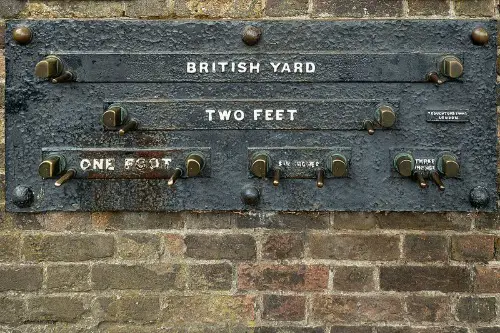
Americans continue to use inches, feet, and pounds while nearly the entire world has moved to the metric system, Erin Blakemore of National Geographic explains. It’s not because the imperial system is more efficient—scientists, engineers, and even most American-made products actually use metric behind the scenes. But suggest switching fully to metric and you’ll see pushback that sounds more like national pride than practicality. “We’re not like the rest of the world,” they say, which is kind of the point.
The U.S. technically committed to metrication in the 1970s, but it stalled almost immediately due to lack of public support. Any attempt to revive the effort usually triggers cries of government overreach. Americans know it’s more logical to go metric, but changing road signs and recipes feels like surrender. So they double down on inches and gallons just to spite the metric system’s smug precision.
3. Daylight Saving Time

Every spring and fall, Americans complain about changing the clocks—yet the practice lives on. It’s disruptive, confusing, and studies show it messes with sleep and even increases accidents. The original justification—energy savings—hasn’t held true in decades. But every time Congress tries to get rid of it, arguments break out over which version of time should be permanent, Isabel Fattal of The Atlantic explains.
The real reason it sticks around? No one wants to let the other side “win” on Standard Time vs. Daylight Time. It’s become a weird partisan proxy fight, with each camp convinced their version of time is more American. Until someone gives up the fight, we’ll keep springing forward and falling back out of habit—and a little spite.
4. School Summer Break

The long summer vacation is often chalked up to outdated farming needs, but that’s only partially true. The real reason it persists is tradition—and a lot of resistance to change. Year-round schooling has been proposed many times and even shown to reduce learning loss. But parents and teachers alike push back, fiercely protective of their summer months.
It’s not just about time off—it’s about holding on to the childhood rite of passage that is summer break. The idea of “robbing kids of summer” feels almost un-American, even when the data says otherwise. So despite inequities and logistical issues, the summer break endures. Not necessarily because it works best, but because letting it go would feel like losing.
5. Keeping the Penny

The U.S. penny costs more to produce than it’s worth, and most people agree it’s a nuisance, according to Chad De Guzman of TIME Magazine. Canada, Australia, and many other countries have phased out their smallest coins without chaos. But Americans still drop them into change jars or toss them in parking lots rather than parting ways with them. Why? Because it feels like giving in to the system.
There’s an emotional attachment to Abraham Lincoln’s face and a fear that rounding prices will somehow be unfair. And anytime a bill to eliminate the penny comes up, someone argues that removing it would hurt “the little guy.” Never mind that businesses already round prices in bulk. The penny stays—largely because people don’t want to be told it’s time to let go.
6. Using Checks
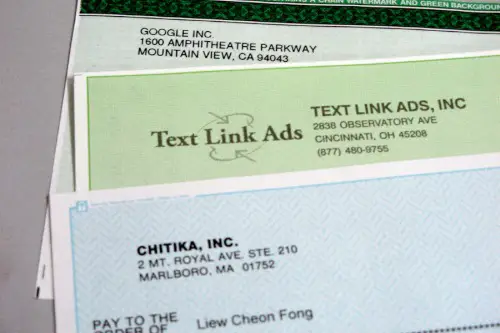
Paper checks are still surprisingly common in the U.S., especially for rent, utilities, and even taxes. Many Americans admit they’re inconvenient, slow, and prone to fraud—but they keep writing them, according to Andrew Van Dam of The Washington Post. The U.S. banking system has been slow to modernize compared to countries with real-time digital transfers. But checks remain a way to avoid fees and hold onto a sense of control.
Some people use them just because they hate change—literally and figuratively. There’s also an “if it ain’t broke” attitude, even when it clearly is. Direct deposit and apps like Zelle exist, but trust in them is often low. Writing a check feels personal and deliberate, even if it’s mostly obsolete.
7. College Sports Obsession
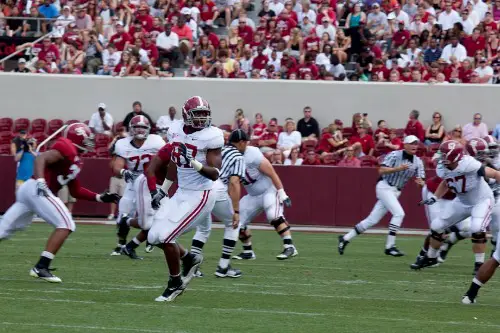
No country elevates college sports the way America does, especially football. Universities pour millions into athletic programs, sometimes at the expense of academics. Critics argue it distorts the purpose of higher education and exploits student-athletes. But suggest scaling it back, and the backlash is immediate.
Why? Because for many, college sports are a point of regional identity and pride. It’s not just a game—it’s a battle between cultures, states, and sometimes class lines. Dismantling the system would feel like giving up a piece of American soul. So it stays, despite the contradictions—almost defiantly.
8. The Pledge of Allegiance

Schoolchildren recite the Pledge of Allegiance every morning, even though few stop to think about what it means. It’s a Cold War-era tradition meant to instill unity and patriotism. But today, many students say it out of habit—or skip it entirely. Still, any proposal to remove it from schools is met with outrage.
People argue it’s about respect, not ideology, even if the original context is long gone. The phrase “under God” wasn’t even part of the original pledge; it was added in the 1950s to combat “godless communism.” But to question the pledge now is to invite accusations of being un-American. So it endures, largely because challenging it feels like a fight no one wants to lose.
9. Lawn Obsession

Americans love a manicured lawn, even if it makes no ecological sense. Lawns consume billions of gallons of water annually, and they’re often treated with chemicals that harm local ecosystems. Native plants and xeriscaping offer better alternatives—but the golf-course look still dominates. Why? Because a perfect lawn signals status, control, and conformity.
Homeowners associations often require grass lawns, even in desert climates. People rebel against mandates, but they’ll also side-eye a neighbor’s dandelions with quiet judgment. The lawn has become a suburban battlefield, and deviating from it can spark conflict. So it’s mowed and watered out of stubborn tradition more than necessity.
10. Driving Everywhere

American infrastructure is built around cars, and most people accept it as just the way things are. Walkability, public transit, and biking are rare in many cities—not because they’re impossible, but because they’re undervalued. Even when gas prices soar or climate concerns rise, many still resist alternatives. Owning a car equals freedom, and freedom is sacred.
When cities try to add bike lanes or limit cars, the backlash is loud and swift. It’s framed as an attack on personal liberty, even when the change would benefit public health. There’s a deep-rooted identity in being a driver, especially in suburban and rural areas. So Americans keep driving solo—often out of habit, but sometimes just to make a point.
11. High School Prom

Prom is a rite of passage that costs a small fortune and creates massive stress for teens and parents alike. The dresses, limos, photos, and post-prom drama are all part of the deal. Many students find it overrated or exclusionary, but few skip it entirely. Because in America, missing prom feels like missing a piece of youth itself.
Even when schools try to offer alternatives, there’s often backlash from students and alumni alike. Prom has become bigger than just a dance—it’s a cultural checkpoint. Skipping it can spark judgment or pity, as if you’re not doing adolescence right. So people keep going, whether they want to or not, partly out of obligation and partly out of pride.
12. Tipping in Restaurants
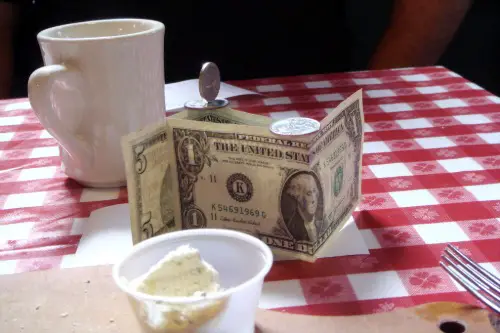
Americans are fiercely attached to tipping, even though it’s a system that most other countries abandoned—or never embraced. The U.S. model puts the burden of fair wages on customers, not employers, and many people know it’s flawed. Still, they keep tipping 15–20% because not doing so feels like punishing underpaid workers. Ironically, many Americans defend tipping as a form of freedom—while simultaneously complaining about how awkward and inconsistent it is.
The kicker? Tipping in the U.S. became widespread after the Civil War, particularly among employers who didn’t want to pay formerly enslaved people full wages. Many countries have banned or limited tipping for exactly that reason. But in the U.S., it’s been clung to almost as a patriotic act, especially when Europeans criticize it.
13. Saying “God Bless America” After Every Speech
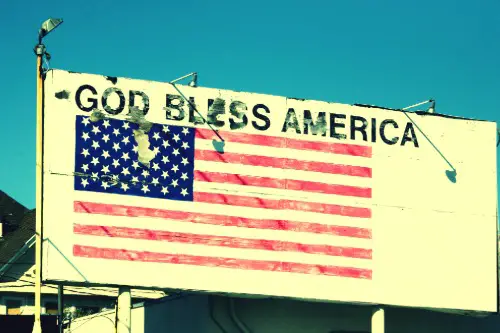
Politicians almost reflexively end public speeches with “God bless America,” regardless of the topic. It’s not required by law, but it might as well be. The phrase became popular during times of crisis, like World War II and after 9/11. Now, it’s used as a signal of loyalty and faith, even when it doesn’t fit the context.
Critics argue it blurs the line between church and state, but dropping it feels risky. No one wants to be the politician who didn’t say it and lost votes because of it. So it sticks around, less out of sincerity and more because not saying it would draw fire. It’s patriotism by ritual—and resistance to any perceived challenge to it.
14. The Electoral College
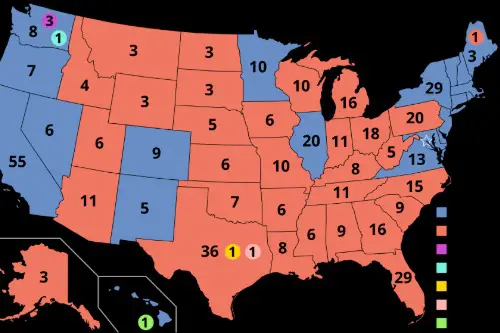
Americans routinely criticize the Electoral College, especially when it delivers a president who didn’t win the popular vote. Yet efforts to abolish or reform it always stall. The system was designed in the 18th century and reflects compromises with slaveholding states. But today, defenders claim it protects small states from being ignored.
It’s a system most Americans learn to accept—even while knowing it’s unfair. The real reason it persists? Each side fears changing the rules might benefit the other. So despite widespread frustration, it lives on as a stubborn relic of the past.
15. Black Friday Madness

Every year, people trample each other for TVs the day after they were supposedly giving thanks for what they already had. Black Friday is chaotic, overhyped, and increasingly irrelevant thanks to online deals. Yet stores still open early, and shoppers still line up in the dark. It’s less about savings and more about tradition and adrenaline.
Even as more Americans criticize the holiday for being soulless or stressful, they keep participating. Some do it for the thrill, others just to say they scored a deal. And for many, skipping it feels like surrendering to critics who say it’s dumb. So they keep the chaos alive—if only to prove it still means something.


